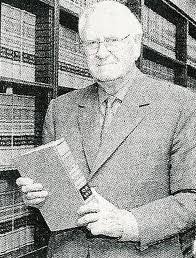
Lyndon Olson, Sr. (center) shares a laugh with Pat Beard (left) and Bernard Rapoport (right).
On January 31, the Waco Civic Theatre begins a two-week run of To Kill a Mockingbird, a play based on the Pulitzer Prize-winning novel by Harper Lee. Set during the Great Depression in fictional Maycomb, Alabama, the enduring tale has become one of the most widely read books dealing with race in America. Furthermore, its protagonist and moral hero, the virtuous lawyer Atticus Finch, is regarded as an aspirational model for lawyers everywhere.
The Waco Civic Theatre performance is produced by Central National Bank. And, just before the stage curtain rises, audience members will learn about the Waco attorney once described by State Bar of Texas President Broaddus Spivey as the “real-life Atticus Finch”.
Finding the real-life Atticus Finch
In his review of Mike Papantonio’s book, In Search of Atticus Finch, Spivey recalls a major trial that ensued after a large twin-engine aircraft crashed south of San Antonio, killing seven prominent Waco residents. The number of families, observers and attorneys was so large, Spivey remembers, that the trial was held in the Scottish Rite Temple in Waco. Among the notable attorneys representing clients—John Hill, Joe Jamail, Wayne Fisher and others—Spivey observed something special about Waco attorney Lyndon Olson, Sr.
“When Lyndon Olson, Sr. rose to his feet and addressed the jury, the image of Atticus Finch was all that I saw,” wrote Spivey. “I knew then, as we know now, that this was not a man who exclusively represented the silks and gowns of Waco, nor did he hire out only to the prominent businesses and businessmen. [He represented] many of those who cannot pay a full fee and some who can pay no fee.”
It was from this experience that Spivey concluded, “Lyndon Olson, Sr. practices law the way Atticus Finch did.”
Representing clients beyond Waco
In 1968, Olson represented Mayor Hank Avery of Midland, Texas. Avery and Olson challenged the districting scheme of the Midland County Commissioners Court, arguing that the Midland County districts and their representation were unfairly weighted to favor rural areas.
The case ultimately reached the United States Supreme Court and went on to become a pivotal decision on election law, holding that the “one man, one vote” rule established in Reynolds vs. Sims applies to local elections. You can hear an excerpt from Olson, Sr.’s argument before the U.S. Supreme Court in this video:
“There’s a short list of lawyers who can say they’ve represented a case before the U.S. Supreme Court, and there’s an even shorter list who can say they actually won,” said Central National Bank CEO Bill Nesbitt, who holds a J.D. from Baylor Law School and who served alongside Olson for a number of years on Central National Bank’s board of directors. “It’s quite remarkable what he achieved—not just in that particular case, but throughout his career.”
Honoring Olson
When Waco Civic Theatre Executive Director Eric Shephard met with Nesbitt a few months ago to discuss corporate sponsorship opportunities, he expected a negotiation. But, little did Shephard know that the group’s scheduled production of To Kill a Mockingbird would make for a perfect collaboration.
“It felt very much like a conversation and not a negotiation,” recalls Shephard. “I was happy with the outcome, and I felt like I made a friend. And, I got to know more about Lyndon Olson, Sr., a person I had heard about, but knew almost nothing beyond the name.”
For Nesbitt and Central National Bank, the civic theatre’s production presented a fitting opportunity to honor Olson’s legacy.
 “Lyndon, Sr. was a man who never did anything to put himself in the spotlight or to ingratiate himself to people. He never analyzed an issue as to the political impact it might have on him. He decided what was right according to his own personal conscience and that is what he did,” said Nesbitt. “It is hard to imagine that kind of man, but that is who he was, and why he was dubbed a modern-day Atticus Finch.”
“Lyndon, Sr. was a man who never did anything to put himself in the spotlight or to ingratiate himself to people. He never analyzed an issue as to the political impact it might have on him. He decided what was right according to his own personal conscience and that is what he did,” said Nesbitt. “It is hard to imagine that kind of man, but that is who he was, and why he was dubbed a modern-day Atticus Finch.”
A special and unique production
As part of the production, the Waco Civic Theatre plans to bring in over 1,200 schoolchildren to see the show. According to Shephard, they’ve received incredible response to the initiative.
“We originally thought to do only a few performances. But, they are so popular that—even with doing three performances each day—we still have had to turn away hundreds of kids. I think it’s safe to say that the program is popular.”
Additionally, the civic theatre is partnering with the One Book One Waco program, which recently tapped To Kill a Mockingbird as its community-wide reading selection.
While the added attention from these programs is exciting to Shephard, he’s most looking forward to the production itself, which will be presented “in the round”, meaning that the stage will surround the audience. Shephard thinks this will create a unique experience for audience members.
“Theater can affect people in all sorts of ways, depending upon the way in which the story is told. I think people will find the play an intimate experience, one that can touch them in a really profound way.”
It’s a profound production to honor the profound legacy of the “real-life Atticus Finch”.
For dates & times, as well as to purchase tickets, please visit: http://wacocivictheatre.org/ourseason.html


